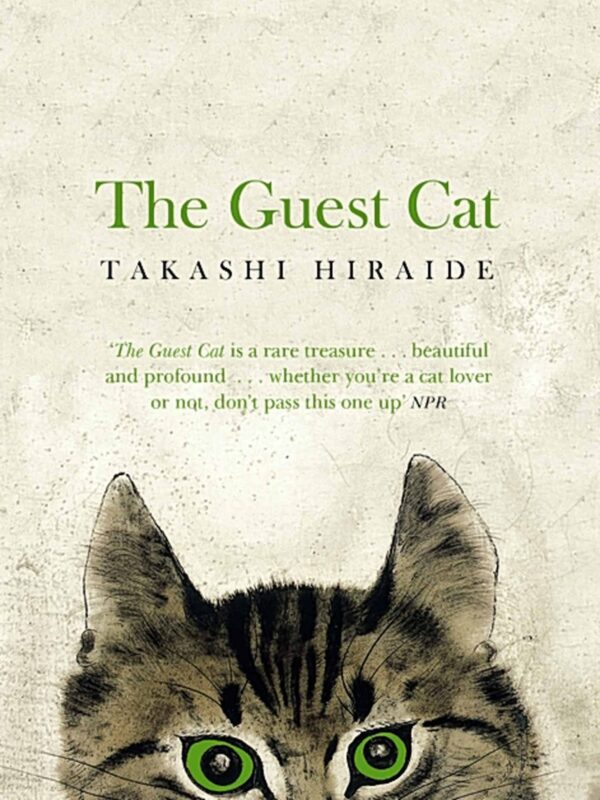
The Guest Cat by Takashi Hiraide focuses on a childless couple who is adopted by the neighbor’s cat. The novella offers a detailed slice of life set in the late 1980s. It’s hard to believe that is over 30 years ago! The author isn’t familiar with cats, so Chibi’s antics surprise and delight him. Chibi doesn’t do anything a cat wouldn’t normally do. She hunts insects in the gardens of the neighborhood and makes herself at home when given a chance.
The author and his wife get along well. The main drama of the story centers around everyday events. When one of the couple’s elderly landlords dies, the widow decides to sell the property. The work-from-home couple then has to find a new apartment, one away from Chibi. The couple gets along well, with only normal, small arguments. This isn’t a romance novel or anything of the sort. Rather, it meditates on the normal gifts of life, and, as you should expect from Japanese literature, how transient they can be.
Hiraide handles this by focusing on minute detail:
A pond, which received water cascading over a waterfall, was located in the center of the garden a little to the east, and there were two planters for water lilies–embracing more than one variety of the aquatic flower–embedded in the earth a short distance from the pond and near the veranda. In addition, there was a smaller cobalt-blue Chinese porcelain planter farther away from the veranda, at the edge of the pond, filled with the same black water and more water lilies.
The Guest Cat is a short book, but descriptions like these often have allusions. Black water and lilies suggests Buddhism’s teachings on impermanence. Lilies represent rebirth and enlightenment, and they grow out of the black mud of life. In other words, enlightenment can only come from the midst of life. Of course, there’s a danger in reading too much into Hiraide’s descriptions. However, these descriptions offer moments of aware reflection on the mundane. Here’s another example:
So many windows still had a relaxing effect on the weary. On the south side, running the full length of the room, there was a large window from knee-high up to the ceiling, which was nearly twelve feet wide and provided a sweeping view of the horizon. And yet, since the owner’s garden wall ran on beyond the house, and as there were no real windows to speak of in the wall of the large neighboring residence to the east, and because of the natural features of the land itself with its downward southerly slope, no eyes fell on the interior. Partway out, the events–their outermost half of glass–hung over the garden and became an oblique skylight inviting in all the sunlight one wanted.
The languid sentences of this description suggest the lazy, hot days of summer cooled by the wind blowing through the traditional Japanese house. Yet, despite the large windows, the author enjoys privacy: a luxury for someone living in a city during the 1980s. There’s a pleasure, a joy, to the passage. No buildings obstruct the wind or the sunlight. This is what I mean by mundane, unnoticed pleasures.
The fact little happens in the book, other than Chibi’s cat antics, and a few pivotal yet unfortunately normal events, doesn’t mean the book is boring. Hiraide offers many read-between-the-lines philosophy that you will miss unless you watch for them. Most of the time, it deals with the relationship among neighbors and the question of who truly is a neighbor. He also touches the question of care versus ownership in regards to Chibi and the gardens.
The author, who is the main character, moves from disliking cats to liking cats. “The Guest Cat” doesn’t focus on life shattering events, making it a realistic read. After all, few of us have exciting life stories, exciting in media terms anyway. Hiraide’s work shows us that the mundane is exciting if you pay attention.
The book released in 2001, yet it contains many of the threads I’ve read in Heian literature. Authors write from their cultural contexts. We can’t do anything else! Fortunately, that cultural context can expand by reading books like The Guest Cat and The Confessions of Lady Nijo and other works from different cultures. If you like action, you may not like The Guest Cat. However, the book is only 136 pages. I recommend you give it a try anyway and try to appreciate it as a reflective, every-day life story. If you are a cat lover, the story will make you smile. Hiraide does a good job capturing the antics of a curious, confident cat.
Reading The Guest Cat will make you look at the small happiness in your own life: the gardens and the cats of your life.



